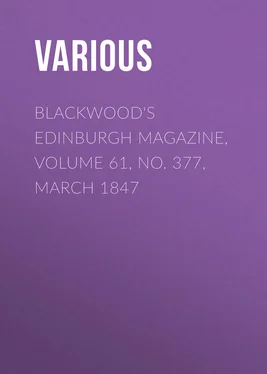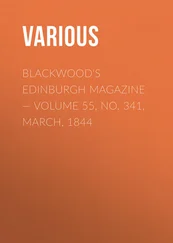Various - Blackwood's Edinburgh Magazine, Volume 61, No. 377, March 1847
Здесь есть возможность читать онлайн «Various - Blackwood's Edinburgh Magazine, Volume 61, No. 377, March 1847» — ознакомительный отрывок электронной книги совершенно бесплатно, а после прочтения отрывка купить полную версию. В некоторых случаях можно слушать аудио, скачать через торрент в формате fb2 и присутствует краткое содержание. Издательство: Иностранный паблик, Жанр: periodic, foreign_edu, Путешествия и география, на английском языке. Описание произведения, (предисловие) а так же отзывы посетителей доступны на портале библиотеки ЛибКат.
- Название:Blackwood's Edinburgh Magazine, Volume 61, No. 377, March 1847
- Автор:
- Издательство:Иностранный паблик
- Жанр:
- Год:неизвестен
- ISBN:нет данных
- Рейтинг книги:4 / 5. Голосов: 1
-
Избранное:Добавить в избранное
- Отзывы:
-
Ваша оценка:
- 80
- 1
- 2
- 3
- 4
- 5
Blackwood's Edinburgh Magazine, Volume 61, No. 377, March 1847: краткое содержание, описание и аннотация
Предлагаем к чтению аннотацию, описание, краткое содержание или предисловие (зависит от того, что написал сам автор книги «Blackwood's Edinburgh Magazine, Volume 61, No. 377, March 1847»). Если вы не нашли необходимую информацию о книге — напишите в комментариях, мы постараемся отыскать её.
Blackwood's Edinburgh Magazine, Volume 61, No. 377, March 1847 — читать онлайн ознакомительный отрывок
Ниже представлен текст книги, разбитый по страницам. Система сохранения места последней прочитанной страницы, позволяет с удобством читать онлайн бесплатно книгу «Blackwood's Edinburgh Magazine, Volume 61, No. 377, March 1847», без необходимости каждый раз заново искать на чём Вы остановились. Поставьте закладку, и сможете в любой момент перейти на страницу, на которой закончили чтение.
Интервал:
Закладка:
It is probable that a plan of this description might have a great and beneficial effect in diminishing juvenile crime; and it is conceivable that the clauses of the bill may be so framed as to develop all the good, and avoid the evil. It is to be feared, however, that the bill is founded on partial views. The children who agree with the descriptions given in clause number five, are the offspring of those who reside in poor neighbourhoods, where the inhabitants are already paying high rates, – high in proportion to the poverty of the locality. If this be so, then every possible species of opposition, which can be offered legally or illegally, will be directed against the bill, and against its being carried into operation. The authorities of these poor and populous parishes already find it a matter of extreme difficulty to collect the rates, and are overwhelmed by the number of those poor housekeepers who apply to be “excused their rates” on the ground of poverty. All the schemes of the present day have one good point only, or it may be discovered by minute observation that the original idea was a good one. The bill is brought forth with a grand display of benevolent feeling; and it is passed, after suffering further distortion in Parliament. The law is, after all, found to be inoperative, from the omission or misapprehension of a plain obvious matter of detail, or because it originated from partial views, or came directly from the brain of an unpractical theorist. It is, however, admitted, in the case of the magistrates’ bill, that the original idea is a good one. And if it should be realised, the children of the class of widows now under consideration, might in this “County Juvenile Asylum,” find a home, and be saved from destruction.
The seventh class consists of women who have cohabited with men, and have families. The individuals composing it generally resemble those of the two classes last mentioned — i. e. they are industrious or idle, intemperate or sober. Generally, this class requires relief more urgently than the several classes of widows; because by their past conduct they are shut out from any participation in many of the charities. It is needless to say that strict investigation into their circumstances and proceedings is necessary.
The eighth and ninth classes consist of single women. The eighth is composed of women who have had two children, and are prostitutes; the ninth of those who have only committed the first offence. The inquiries of the officer, in the ordinary routine, would develop the facts. The utility of this distinction is, that it would afford boards of guardians an opportunity of dealing fairly with the latter class: the fact of the distinction being noted in all the books would attract their attention to the point. To confound these cases together, and to act with, equal severity to all, is obviously unjust. In those unions where the prohibitory order has been issued, all the individuals of both these classes are relieved only in the house. In the case of their admission, the cognisance of this distinction, not casually, not specially, because a guardian may have had his attention drawn to a particular case, but as a matter of routine, would necessarily lead to a good result. No board of guardians, when their attention has been regularly and officially directed to the facts of the case, could compel both classes to herd together in one common room.
The medical relief list is composed of poor persons who are suffering from acute disease, and are, in consequence of their illness and extreme poverty, receiving relief in money or food. Those who are in the receipt of other relief by order of the board, and who belonged to one of the other classes, would be excluded from this list. There are two modes of regulating the medical out-door relief in kind. One mode is to require the medical officers to attend the meetings of the boards of guardians. It is their duty to report upon the state of health of each out-door sick person at specified times, and to state the kind of nutriment adapted to each case. The board is thus furnished with a sanatory report from one officer, and a report upon circumstances from the other. This is a satisfactory system. The other mode is, for the medical officer to report to the relieving officer in a prescribed form, that A B is ill with consumption, and requires – food per diem. The relieving officer has a veto. If, upon visiting the case, he is satisfied that the head of the family can supply the articles recommended, the relief is withheld. The case is reported to the next board, who issue the necessary instructions thereon. The first plan is undoubtedly the preferable one, in all those parishes or unions where the population is large and the area small. But in all large rural unions, where the medical officers are many and their labours great, from bad roads and extent of district, the plan would be inapplicable. As regards the second method, it would be found to prevail as a rule, that, in the majority of cases, the recommendation of the medical officer is regarded by the relieving officer as tantamount to an order. The exception would be in those unions where the board is infested by persons who know of no means of estimating the value of an officer excepting by his supposed power of reducing expenditure; and in those parishes where the inhabitants are poor and embarrassed. And it is to be feared that this evil, against which the press exclaim so loudly, will continue to predominate so long as the existing unequal charge upon parishes continues. The magnates of St. George, Hanover Square, can afford to be magnanimous and humane. In St. Luke, Middlesex, or St. Leonard, Shoreditch, where the rate-payers are poor, it is a different matter altogether. And yet it is in these poor neighbourhoods that the poor live; and where they live, there they must be relieved.
The administration of the relief given in consequence of poverty and illness requires great care. The list contains the most meritorious of the poor: and as the relief given is of the greatest value, it is the relief most sought after by “cadgers” and impostors. The great abuses which creep into the administration of out-door relief do not arise from the relief of the able-bodied, but from affording relief to persons who allege that they are suffering from bodily ailments without proper investigation. In ordinarily well managed parishes, impostors, cadgers, and mendicants have no chance of obtaining relief in money. Therefore the whole of their practised cunning is brought to bear upon this more valuable form of relief. Now, from the peculiar habits of this class of persons, there is often strong ground for the claim. They will starve three days, and complete the week in revel and debauchery. Those periods, which they consider days of prosperity, are too often occasions for emaciating their bodies by drinking gin and eating unnutritious food. A chilly, foggy, November night is the time when the supposed widow can parade her children on the highway with the best chance of exciting the compassion of the passersby; and it is the time, too, when, if there is any predisposition to disease, the circumstances are most favourable for its development. It is to this class that the workhouse may be offered – as an infirmary. It is a fact, however, that those of this class who suffer from external diseases, and especially those which may be exposed with impunity, do not desire to enter a workhouse, and will not remain there until they are completely cured. And then, with reference to children who are exposed at night in the streets, notwithstanding the parents may be warned that they are sowing the seeds of incurable disease in the bodies of these infants, and are offered relief sufficient to constitute the greater part of their support; yet, however they may promise, they will continue to sleep in the day-time, and prowl about as homeless outcasts in distant neighborhoods at night. It is useless to offer them the workhouse; they will refuse it, and make, the offer a ground of appeal to the benevolent. As regards the children, the medical officer declares that his medicines are useless, and even dangerous. They are taken in the morning, the child is exposed in the evening, and in a few months it dies — a natural death ? Here is lower depth of crime and misery which baffles the benevolent and wise. 5 5 If the reader will refer again to the form of “Relief List,” he will perceive that there are three general divisions, named severally, ordinary, medical, and casual. These terms were preserved, because they are well known in actual practice, rather than because they express a really broad distinction. The ordinary relief list is supposed to contain all those recipients of relief who are likely to continue chargeable for a long period. But the distinction attempted to be drawn between those who may require relief for a long and those who require it for a short period only, depends upon circumstances too vague and variable to be of any practical utility. These objections are not applicable to the generic term “medical.”
Интервал:
Закладка:
Похожие книги на «Blackwood's Edinburgh Magazine, Volume 61, No. 377, March 1847»
Представляем Вашему вниманию похожие книги на «Blackwood's Edinburgh Magazine, Volume 61, No. 377, March 1847» списком для выбора. Мы отобрали схожую по названию и смыслу литературу в надежде предоставить читателям больше вариантов отыскать новые, интересные, ещё непрочитанные произведения.
Обсуждение, отзывы о книге «Blackwood's Edinburgh Magazine, Volume 61, No. 377, March 1847» и просто собственные мнения читателей. Оставьте ваши комментарии, напишите, что Вы думаете о произведении, его смысле или главных героях. Укажите что конкретно понравилось, а что нет, и почему Вы так считаете.












